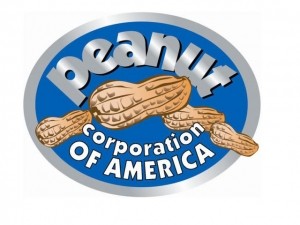What is the price of unethical behavior? For peanut executive Stewart Parnell, it is 28 years in prison. He is 61 and he will undoubtedly die behind bars. However his intentional sale of peanut butter containing salmonella resulted in the deaths of nine people and sickened hundreds. He is a callous murderer.
 According to the Associated Press (September 21, 2015) entitled: “Peanut executive in salmonella case gets 28 years,” we learn:
According to the Associated Press (September 21, 2015) entitled: “Peanut executive in salmonella case gets 28 years,” we learn:
“Stewart Parnell, the 61-year-old former owner of Peanut Corporation of America, was sentenced in Albany, Georgia, He and two co-defendants were convicted in U.S. District Court.
Jurors found Parnell knowingly sold tainted peanut butter from his Georgia plant and faked results of lab tests intended to screen for salmonella. Court officers recommended a life sentence based on reports that the outbreak cost Parnell’s customers $144 million and sickened 714 people.”
Not only did Parnell’s unethical behavior cause death and sickness, because he supplied the product to several ethical companies, it affected their reputations and sales in the marketplace.
Equal in culpability was Michael Parnell (Stewart Parnell’s brother) and the former quality control manager, Mary Wilkerson. There are, unfortunately, many men and women in business like Stewart Parnell. For them, “ethics” is just a word. However, it is Mary Wilkerson and those “like her” for whom this blog is written.
Resisting unethical pressures
Mary Wilkerson will likely find herself facing a jail sentence as well. It will not be as severe as Parnell’s, but it will have “teeth.” While she did not have the final say, as the head of quality control, she knew exactly what the results were yielding and what the implications would be for the company. If her boss based his unethical decisions on greed, gut-feelings and a lack of morality, it was Wilkerson who decided to release tainted product while overriding scientific results and established protocols.
We don’t know why she chose to take an unethical path, but my guess it was that in her mind an obligation to a corrupt boss was more important than a duty to protect their customers.
Perhaps she felt pressure because the company was in financial trouble, and the sale of the tainted material was essential to the firm’s survival; perhaps it was due to poor or sloppy testing techniques or even something as “human” as an improper relationship. It would not be the first time in history ethics in the workplace were altered for something as simple as an improper affiliation.
No matter the reason, a person in middle management compromised the lives of hundreds of people because she was pressured to make an unethical choice that would lead to serious consequences. I fear saying this, but it is not the first time I have witnessed food quality assurance rules being bent due to unethical behavior.
It is not possible to turn back the clock, but about now I am sure Mary Wilkerson wishes she could take her decisions back. Any sense of obligation she may have felt to protect her bosses and company by falsifying or ignoring her results will now shrink in the light of good ethics and legal consequences.
The best way to empower the Mary Wilkerson’s of the world is to back them so that their fight is not an isolated and lonely fight. If, at any point, Mary Wilkerson needed to take a stance, someone needed to stand with her. Conversely, someone needed to admonish her that she was about to make a tragic decision. She was in a position to prevent eight deaths; she abdicated her responsibility.
For the middle manager, ethical issues are always frightfully difficult to navigate in the absence of support. This is why I feel it is essential to require ethical training of management especially in industries involving food, pharmaceuticals, construction and manufacturing. This training should not only receive the approval of HR departments but any agency licensing the facilities.
YOUR COMMENTS ARE WELCOME!

